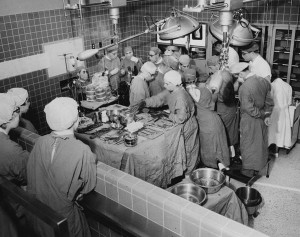
Cleveland’s real Cardiac Kids aren’t the Browns of the 1980s, but rather the cardiac surgeons of the 1950s and 60s—doctors who took risks and pioneered innovations.
Discover more about these innovations at The Dittrick Medical History Center and Museum and the Global Center for Health Innovation’s “Exchanges” event Tuesday, Feb. 9, at 6:30 p.m. at the Global Center (1 St. Clair Ave., NE).
Many people are now familiar with the paddles of defibrillation devices, and with the command “Clear!” before electrical stimulus is applied, but imagine a time before when cardiac arrest meant certain death. Claude Beck’s defibrillator offered hope, the first device of its kind to bring a patient back from the brink during open-chest surgery.
Beck (1894-1971) devised ways to revive heart attack victims with the use of carefully controlled electricity, but Beck’s defibrillator cannot be isolated from two other innovations, the Kay-Cross Oxygenator and bypass surgery.
Oxygenators allowed for stopped-heart surgery (and more delicate operations), while the defibrillator allowed doctors to re-start the heart. Then, in 1958, F. Martin Sones discovered moving cine-coronary angiography, a technique for visualizing the inside of the coronary arteries. Ten years later, Donald Effler and his colleagues performed the first cardiac transplant in the Midwest.
All of these “firsts” were accomplished through risk-taking, a hallmark of Cleveland successes generally. But luck—and even accident—sometimes played a role.
Today, defibrillators serve as a cornerstone of emergency medical care, but innovation doesn’t stop there. In addition to a greater understanding of heart disease and better avenues to care, today’s advancements include subcutaneous implantable defibrillators, and new endovascular innovations. What might the future hold?
The panel will be composed of:
- Karl West, director of Medical Device Solutions at Cleveland Clinic
Lerner Research Institute - Sahil Parikh, interventional cardiologist at the University Hospitals Harrington Heart & Vascular Institute
The presentation will end with a public forum and roundtable discussion.
Registration for this event is available online.
